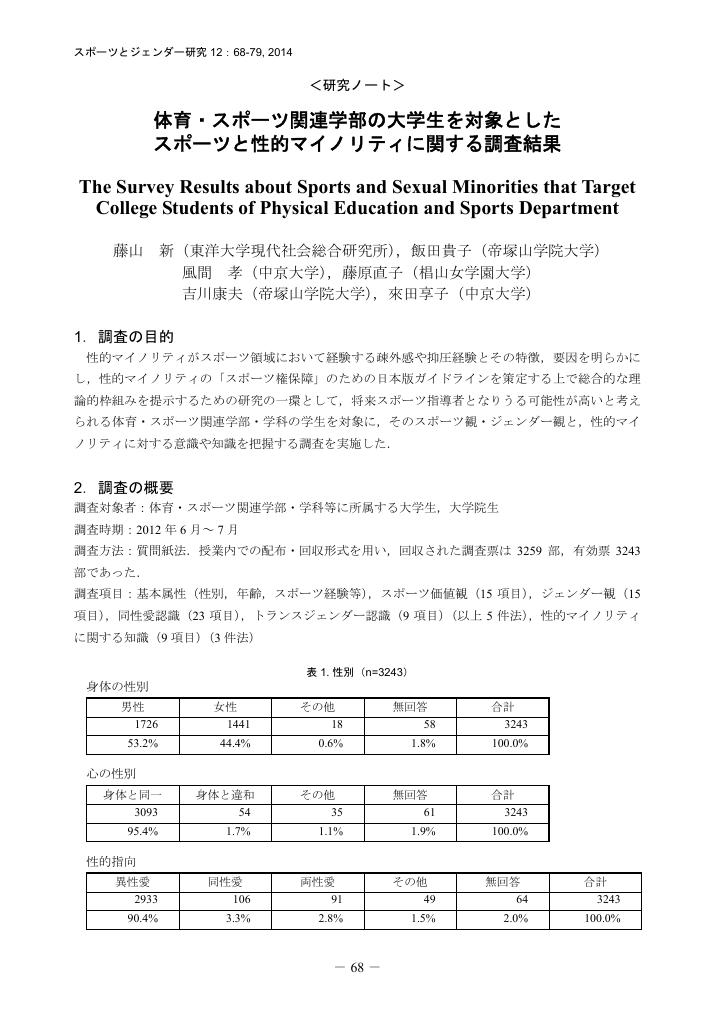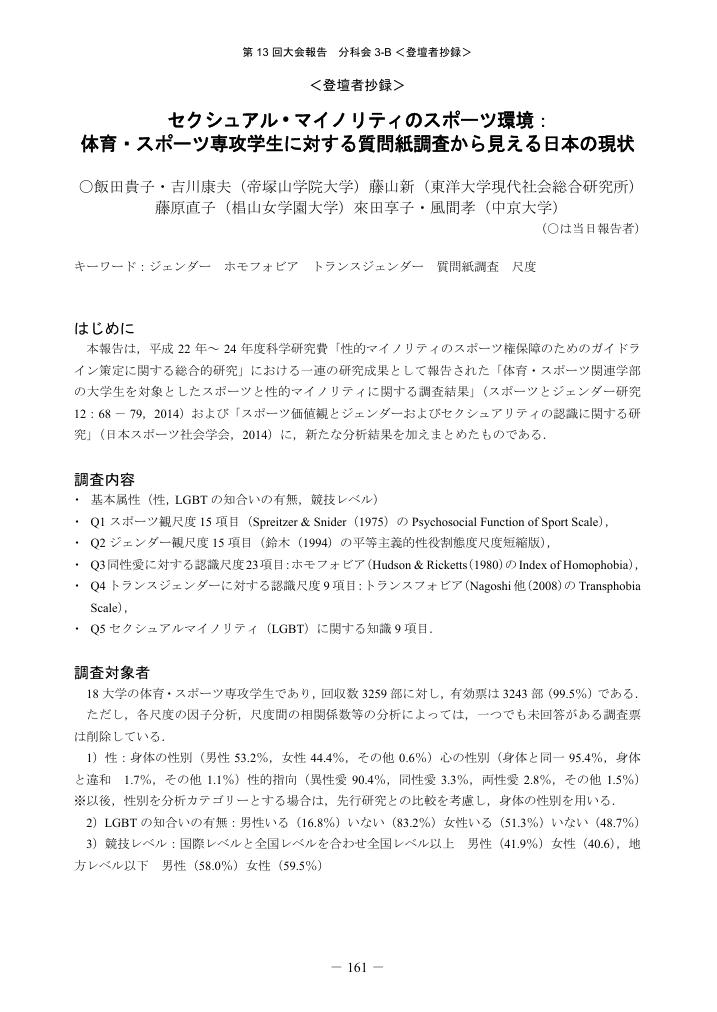4 0 0 0 OA 体育・スポーツ関連学部の大学生を対象としたスポーツと性的マイノリティに関する調査結果
- 著者
- 藤山 新 飯田 貴子 風間 孝 藤原 直子 吉川 康夫 來田 享子
- 出版者
- 日本スポーツとジェンダー学会
- 雑誌
- スポーツとジェンダー研究 (ISSN:13482157)
- 巻号頁・発行日
- vol.12, pp.68-79, 2014 (Released:2017-04-28)
- 参考文献数
- 12
- 被引用文献数
- 8
- 著者
- 藤山 新 飯田 貴子 吉川 康夫 井谷 聡子 風間 孝 來田 享子 佐野 信子 藤原 直子 松田 恵示
- 出版者
- 日本スポーツとジェンダー学会
- 雑誌
- スポーツとジェンダー研究 (ISSN:13482157)
- 巻号頁・発行日
- vol.8, pp.63-70, 2010 (Released:2021-01-01)
- 参考文献数
- 7
4 0 0 0 OA 身体能力における性差再考 : スポーツ・パフォーマンスを中心に
- 著者
- 飯田 貴子
- 出版者
- 大阪府立大学女性学センター
- 雑誌
- 女性学講演会 (ISSN:18821162)
- 巻号頁・発行日
- vol.16, pp.1-20, 2013-03
3 0 0 0 OA 体力テストとジェンダー
- 著者
- 飯田 貴子
- 出版者
- 一般社団法人 日本体育学会
- 雑誌
- 日本体育学会大会号 第46回(1995) (ISSN:24330183)
- 巻号頁・発行日
- pp.185, 1995-09-10 (Released:2017-08-25)
3 0 0 0 OA セクシュアル• マイノリティのスポーツ環境
- 著者
- 飯田 貴子 吉川 康夫 藤山 新 藤原 直子 來田 享子 風間 孝
- 出版者
- 日本スポーツとジェンダー学会
- 雑誌
- スポーツとジェンダー研究 (ISSN:13482157)
- 巻号頁・発行日
- vol.13, pp.161-163, 2015 (Released:2017-04-14)
本研究は、スポーツ内で生じるセクシュアル・ハラスメント問題の現状を解明するための最初のアプローチとして、女子大学生のスポーツ領域におけるセクシュアル・ハラスメント認識と経験を調査し、その特殊性を明らかにすることを目的とした。第一に、女子大学生について、セクシュアル・ハラスメントの経験および認識に関する全体的な状況を把握した。第二に、スポーツにおけるセクシュアル・ハラスメントについての経験や考えに関して女子大学生に対するグループインタビューを行った。第三に、体育系の女子学生とそれ以外の女子学生のセクシュアル・ハラスメント経験スポーツの場とスポーツ以外の場で比較し、両グループの経験および認識の差異を検討した。第四に、上記の調査結果を総合的に分析し、諸外国の調査事例との比較検討も含め、日本のスポーツにおけるセクシュアル・ハラスメントの特徴を女子学生の視点から考察した。体育系女子学生がスポーツの場で経験するセクシュアル・ハラスメントと、体育系以外の女子学生がスポーツ以外の場で経験するセクシュアル・ハラスメントの違いに関して、前者は「身体的特徴を話題にする」「腕や肩にさわる」などの行為を、後者はこれら2項目に加え、「性的なことばや冗談」「性的経験について質問」「からだを眺め回す」などの行為を多く経験していた。両者の認識の違いに着目すると、設定した19項目の行為のうち、17項目について、体育系女子学生(スポーツの場)は体育系以外の女子学生(スポーツ以外の場)よりもセクシュアル・ハラスメントになりうる行為に対して許容的であることが明らかになった。とりわけ、前者が経験する身体接触的行為については、これをセクシュアル・ハラスメントと認識しない学生も多く存在し、指導ゆえに許容される身体接触行為のなかに、同時にセクシュアル・ハラスメントとなりうる契機が存在することもまた、確認された。
- 著者
- 高峰 修 飯田 貴子 井谷 惠子 太田 あや子 熊安 貴美江 吉川 康夫
- 出版者
- 日本スポーツとジェンダー学会
- 雑誌
- スポーツとジェンダー研究 (ISSN:13482157)
- 巻号頁・発行日
- vol.7, pp.16-28, 2009 (Released:2023-06-28)
- 参考文献数
- 5
- 被引用文献数
- 1
The purpose of this study is to examine the relationships among items of sexual harassment (SH) experienced by female Japanese college students inside of sport settings. Respondents were asked to answer whether or not they had experienced as SH 19 specific male behaviors toward female college students inside of sport settings. Data was collected by questionnaire. The survey was addressed to 4,208 students at 23 colleges, from June to November, 2003, and in October, 2006, and 3,989 students responded. Nine hundred ninety eight female students belonging to intercollegiate athletic clubs, and 477 female students belonging to intramural sport clubs were available for statistical analysis in this study. The experiences of SH inside of sport settings were first compared with respect to two types of sport clubs. Female students reported that they had been physically touched or massaged, or had been told jokes of a sexual nature. Among members of intercollegiate clubs, the percentage of persons who perceived “physical touching” behavior as SH was lower than that among members of intramural clubs. Intercollegiate club members reported their harassers to be instructors employed from outside their universities, while intramural club members reported them to be faculty members and upperclassmen in their clubs. Many female students reported that, when they experienced SH behavior inside sport settings, they shrugged of the behavior, did nothing, or were unable to do anything. Logistic regression analyses were conducted to examine the structure of behavior experienced as SH. Among intercollegiate athletic club members, “persistent sexual advances” as a dependent variable was significantly explained by three variables: “ask female students out to dinner or on a date,” “send e-mail with sexual content,” and “give female students a back/shoulder massage while giving instructions,” while among intramural club members, only “make female students serve tea or perform personal tasks” significantly explained “persistent sexual advances.” Finally, the importance of considering the structure of experienced SH items is discussed.
1 0 0 0 OA 性的マイノリティについての知識に関する考察
- 著者
- 飯田 貴子 藤山 新 來田 享子 風間 孝 藤原 直子 吉川 康夫
- 出版者
- 日本スポーツとジェンダー学会
- 雑誌
- スポーツとジェンダー研究 (ISSN:13482157)
- 巻号頁・発行日
- vol.16, pp.20-35, 2018 (Released:2018-12-29)
- 参考文献数
- 20
- 被引用文献数
- 1
The purpose of this study is to examine the relationships between the knowledge about sexual minorities and gender views, homophobia, transphobia and the sense of value for sport. The participants were 2,763 college students who were in the departments related to physical education or sports in Japan at the time of study (male students: 1,493, female students: 1,270). The questions regarding sexual minorities were created by authors. The four scales used in this study include: gender views (the Short-form of the Scale of Egalitarian Sex Role Attitudes: Suzuki, 1994); homophobia (the Index of Homophobia: Hudson & Ricketts, 1980); transphobia (the Transphobia Scale: Bornstein, 1998); and the sense of value for sport (the Psychosocial Functions of Sport Scale: Spreitzer & Snyder, 1975). The result shows that those who gave more correct answers to the questions concerning the knowledge about sexual minorities tend to hold more egalitarian beliefs on gender equality. They also tend to be less homophobic and transphobic. Those students, both female and male, who had more correct knowledge about sexual orientation and biological sex tend to be significantly less homophobic and transphobic. Therefore, the result suggests that having the knowledge about the diversity of sexual orientation and biological sex is a crucial factor for the better understanding of LGBT. On the other hand, those who gave more wrong answers to the questions concerning the knowledge about sexual orientation and biological sex tend to have stronger sense of value for sport. This tendency of prejudice was more salient among male participants. The correlation between a support of sexual binary system and a stronger sense of value for sport showed in this study requires further examination.
1 0 0 0 競技者のジェンダー化
- 著者
- 飯田 貴子
- 出版者
- 日本スポーツとジェンダー学会
- 雑誌
- スポーツとジェンダー研究
- 巻号頁・発行日
- vol.15, pp.63-69, 2017
1 0 0 0 OA 競技者のジェンダー化
- 著者
- 飯田 貴子
- 出版者
- 日本スポーツとジェンダー学会
- 雑誌
- スポーツとジェンダー研究 (ISSN:13482157)
- 巻号頁・発行日
- vol.15, pp.63-69, 2017 (Released:2017-12-10)
- 参考文献数
- 5
1 0 0 0 リトルスター英会話辞典
1 0 0 0 OA 026E20804 体育・スポーツに関する国際会議決議文にみる男女共同参画の視座
1 0 0 0 OA 20C40805 スポーツと性暴力
- 著者
- 飯田 貴子
- 出版者
- 社団法人日本体育学会
- 雑誌
- 日本体育学会大会号
- 巻号頁・発行日
- no.50, 1999-09-15







